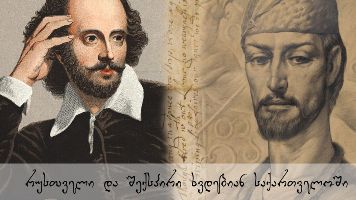

|
The Kartvelologist The Kartvelologist” is a bilingual (Georgian and English) peer-reviewed, academic journal, covering all spheres of Kartvelological scholarship. Along with introducing scholarly novelties in Georgian Studies, it aims at popularization of essays of Georgian researchers on the international level and diffusion of foreign Kartvelological scholarship in Georgian scholarly circles. “The Kartvelologist” issues both in printed and electronic form. In 1993-2009 it came out only in printed form (#1-15). The publisher is the “Centre for Kartvelian Studies” (TSU), financially supported by the “Fund of the Kartvelological School”. In 2011-2013 the journal is financed by Shota Rustaveli National Science Foundation. |
The Plays of Shakespeare’s Late Period and "The Man in a Panther-Skin"
One further important question is the literary or world-view foundation which the playwright relies on, and which inspires him to enter the dreamlike world. This question is also preconditioned by the fact that Shakespeare’s dramaturgy was always closely connected to plot sources. One significant characteristic of Shakespeare’s plays is transformation, rethinking, and novel construction of certain episodes, topics and stories. English literary scholars are of the opinion that the author of Cymbeline was inspired by an as yet unidentified plot story. It has also been noted that this problematic play by Shakespeare is characterised by certain similarities with Beaumont and Fletcher’s dramaturgy of the same period. The plot source of these authors is also unknown (or was until quite recently). Moreover, critics have noted that Cymbeline is connected to other plays of the same period (Pericles, The Winter’s Tale, and The Tempest) as regards not only the ideal and creative world, but also the topic and plot nuances.
keywords:“The Man in the Panther-Skin”, “Cymbeline”, “Pericles”, “The Winter’s Tale”, “The Tempest”. Category: SCHOLARLY STUDIES Authors: Mushvig Chobanov Azerbaijani-Georgian Literary Relations through Historical Development Process
During investigating the development trends of the Azerbaijani literature arose in Georgia in 1960-2010th years, we can see that our scientists, lived-created here, have conducted a number of successful researches in the field of literature and literary criticism and got achievements in the development and research of Azerbaijan- Georgian literary relations. If in 50-60th years of XX century Z. Borchali, A. Mursaloglu and others worked hard in this field, but after 1970 this tradition was followed by professors such as H. Vali-yev, A. Musayev, M. Hajikhalilov, F. Khubanli, Sh. Shamioglu, T. Isabalagizi and others honorably. They published numerous articles in different press organs, as well as gave these research works to the discretion of wide range of readers in books form. Looking through the Azerbaijani-speaking press organs, literary journals and collections published in Georgia in the second half of the 20th century, as well as the books of separate authors published in Baku and Tbilisi, it is clear that artistic translation takes an important place in the creativity of writers, lived-created in Georgia and they do not work in this field, no less. Whereas they fulfilled such a glorious task adequately as translating of number of the samples from Georgian literature into our native language, delivering of spiritual word wealth of the neighboring nation to Azerbaijani readers and so firming of spiritual friendship bridge arches existed between our nations for centuries. That’s why we call them “Friendly voices – Translation Masters”. The path of late D. Aliyeva, T. Huseynov, M.H. Bakhtiyarli, A. Sarajli, I. Ismayilzadeh, V. Rustamzadeh, A. Abdulla, Z. Yagub with special contributions in the field of literary translation, was maintained by D. Karam, A. Binnetoglu, M. Chobanzadeh, H. Valiyev, E. Elsevar, S. Suleymanli, N. Nasibzadeh, V. Hajiler, Sh. Mammadli, I. Mammadli, N. Abdulrahmanli, E. Allazolgu, M. Mammadoglu, R. Hummat, A. Khansultanli, J. Mammadli, O. Kazimli and others successfully and they acquainted themselves in this direction. Their translations published in different press organs periodically, especially in some newspapers such as East Lights, Georgia, Existence, in some collections (Spring, 1980; Morning Star, 1987, 1989, 1990; Two hearts in a chest 1981; Literary Georgia, 2007, 2012 and so on.) are interesting and mentionable in terms of not only qualities of literary translation, but also artistic- aesthetic capacity and the position in the national literature. In particu-lar, the translation creativity of our compatriots who know fluently the Georgian language, Georgian literature, the history of Georgian people, future and psychological mood, is heavier and more successful. keywords:Georgia, Azerbaijan, literary contacts, translation Category: SCHOLARLY STUDIES Authors: Mushvig Chobanov |
Categories Journal Archive |



 The third period of Shakespeare’s works gives rise to a number of questions, such as what triggers this sudden longing from a dreamlike towards a Utopia like state of mind, perhaps the progression of the author’s life from adolescence to maturity or social and political changes in the country? Is it new literary styles and demands of theatre-goers or all of these together? These questions are actual even in the latest Shakespeare studies. These issues are still important for the latest Shakespearean literary criticism .
The third period of Shakespeare’s works gives rise to a number of questions, such as what triggers this sudden longing from a dreamlike towards a Utopia like state of mind, perhaps the progression of the author’s life from adolescence to maturity or social and political changes in the country? Is it new literary styles and demands of theatre-goers or all of these together? These questions are actual even in the latest Shakespeare studies. These issues are still important for the latest Shakespearean literary criticism .